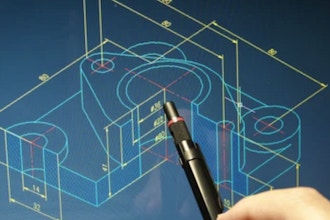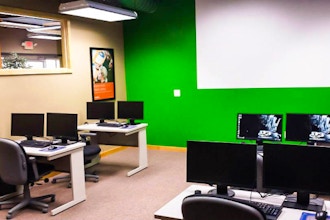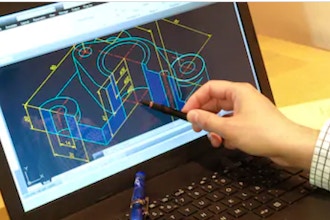Discover the Best AutoCAD Classes in Houston
Design professionals in many industries use AutoCAD, a software program that allows them to create models of designs in two or three dimensions. The acronym “CAD” stands for “computer-assisted design.” While other CAD programs exist—such as ActCAD, SketchUp, and MicroStation–-AutoCAD is still the industry-standard software for computer-assisted design. Since 1982, professionals in planning, design, and construction fields have been using AutoCAD to model their creations.
When many people think of AutoCAD, they understand it as a program primarily designed for drafters or architects to facilitate the creation of plans for a building. In fact, there are lots of other industries and professionals who find AutoCAD essential to their work. For example, it can help urban planners create topographic maps and build city plans. Design professionals—like animators, game designers, and graphic designers–-are using AutoCAD more and more. Civil, mechanical, and electrical engineers also employ AutoCAD as a tool for interpretation and troubleshooting of their designers.
Perhaps you’re wondering what makes AutoCAD the preferred software for these purposes. One reason is that people have been relying on it for a long time to create their 2D and 3D models for professional design purposes. In addition, AutoCAD has stayed the industry-standard software because of the powerful suite of tools it provides for building, developing, testing, and animating design models. The interface is also user-friendly, and AutoCAD makes it easy to integrate and export using other softwares—for example, to produce tangible versions of the design models through 3D printing software. AutoCAD’s developers have also made sure that the program continues to evolve and grow, making it possible to address new technologies and new possible applications as they develop. For example, they have recently added features designed to take advantage of artificial intelligence and augmented reality for their design potential.
Best AutoCAD Classes & Schools in Houston
#1: D3 Technologies—AutoCAD Mechanical Basics
The AutoCAD Mechanical Basics course from D3 Technologies serves students who want to use AutoCAD for mechanical engineering and related purposes. It covers the central features necessary to use the mechanical functions of AutoCAD. Students begin by learning how to create and manage layers for mechanical designs. Next, the course moves on to how they can build geometrical models using the program’s suite of mechanical tools. Then students discover how to use those tools to manipulate the geometrical models they have created. They explore the built-in standard parts for mechanical engineering that they can apply to their designs, like components in a software design program. Finally, students use the built-in annotation features to add explanations to their designs for construction purposes, including labels and dimensions.
Key Information
This one-day course is full-time. It has no prerequisites, but knowledge of mechanical engineering principles is helpful. The cost of tuition is $595.
More Details
According to students, the teachers at D3 Technologies are notable for their “vast technical knowledge” and the “cutting edge” instruction they provide.
#2: Noble Desktop—Introduction to AutoCAD
Students in the Introduction to AutoCAD course from Noble Desktop begin their studies with a tour of the interface in AutoCAD. They first explore how to use the commands for basic drawing and editing in the program. After creating a file in AutoCAD, they make a simple drawing. They then discover how to edit it. This process allows them to learn how they can best exploit the high degree of precision that AutoCAD’s drawing functions offer. At this point in the course, they also study the functions of AutoCAD that allow them to examine their drawing in detail, such as panning across their model and zooming in on it. The course also introduces them to keyboard shortcuts they can use to maximize their efficiency as they exploit the potential of AutoCAD for their designs.
Then, students move on to learn more about AutoCAD’s range of drawing commands, including circles, lines, and rectangles. Once they’ve built a drawing using these functions, they turn them into a layout using the program’s modify tools. Next, they use object snap tracking to view a projection of their model as viewed from above. After that, they explore the more precise drawing tools within AutoCAD. For example, they learn more about object tracking, polar tracking, and snap tracking. These functions make it possible to create a highly precise model. The course concludes by teaching students how to use the editing tools in AutoCAD–-such as the copy, rotate, scale, move, and mirror functions—to modify the drawing they’ve laid out.
Key Information
At three hours a day, this three-day program is part-time. It has no prerequisites. Tuition is $325.
More Details
Noble Desktop has a reputation for excellent instruction in small classes that allow each student to get personal attention from the instructor. Any graduate is allowed to retake a class within one year of completion for free. With their studies, students receive a proprietary workbook from Noble.
Graduates “highly recommend” this course. They found it an “extremely valuable” use of their time because of the “very effective” approach to learning offered by Noble’s “top notch” instructors.
#3: New York City College of Technology—Construction Drawing with AutoCAD
In the Construction Drawing with AutoCAD course offered by the New York City College of Technology, students learn the basics of 2D drawing and modeling in AutoCAD. The course is aimed at design professionals who want to use AutoCAD in their careers as mechanical or structural engineers, architects, or interior designers.
The course begins by introducing students to AutoCAD’s basic interface and the display commands available within it. They learn the fundamental CAD tools of the program. They also explore the software’s drawing setup and the precision tools it offers, such as snaps, grips, and scale coordinate systems. Then, the course becomes hands-on, as students begin experimenting with the program’s simple drawing and editing commands.
Next, students learn how to enhance their drawings with the layer, text, and block functions. They also discover the modify tools available in the program. Then, they plot their drawings to prepare them for printing, and they learn how to print them as well.
Key Information
This 4.5-hour course is full-time. There are no prerequisites for this beginner-level program. Cost of tuition is $715, which includes a $20 registration fee.
More Details
Students praise this course for the “strong practical skills” it provides to graduates. They also appreciated its “interactive and hands-on nature,” as well as the “knowledgeable and skilled” instructors.
#4: Technical Institute of America—AutoCAD Level 1
Students in the AutoCAD Level 1 course at the Technical Institute of America begin their studies by exploring the interface in AutoCAD. First, they learn the functions of the program’s panels, tabs, and ribbons. The course covers its help features and the applications browser within it. Students then discover the basic uses of AutoCAD’s drawing tools, such as making lines, polylines, rectangles, arcs, and circles. For greater precision, they learn how to improve a draft drawing through the use of object snaps.
The course moves on to the program’s copying commands. Students discover how they can move and copy objects. Next, they explore the more complex copying functions in the program—for example, the mirror, array, and offset commands. Then they learn how to modify objects in their drawings. Functions they explore at this point include scale, extend, stretch, trim, fillet, and chamfer.
Students then learn to annotate their drawings for building purposes. They can add dimensions to their plans, as well as descriptive and explanatory text. They also learn how to apply hatch commands to their drawings. They discover layers at this point as well. After learning to create and manage them, they adjust their states using the freeze, lock, isolate, and off commands, among others. They also create multiple layouts of their drawings, so that they can plot them, set their scales, and use the viewport function to examine different scales of the drawings. Finally, the course introduces students to the program’s relationship with paperspace and modelspace.
Key Information
This workshop takes a single full day. There are no prerequisites for this beginner course. The cost of tuition is $749.
More Details
Students find the instructors at Technical Institute of America “fantastic,” because they are “clear,” “straightforward,” and “thorough.” They say the course is “entertaining” and “enjoyable” because of the excellent instructors.
#5: NYC Career Centers—AutoCAD in a Day
Through NYC Career Centers’ AutoCAD in a Day course, students can quickly learn the basics of AutoCAD. They discover how to use the software for the purpose of drafting and technical drawing. The single-day course covers the most basic drawing and editing techniques in AutoCAD, which will make it possible for students to create models of actual mechanical or architectural objects.
NYC Career Centers also offers a three-day course, with AutoCAD in a day as the first day. In the second and third days, students discover layers, properties, measurements, text, and plotting. They learn other vital AutoCAD principles as well.
Key Information
This course is full-time and runs for seven hours. There are no prerequisites. Tuition costs $325.
More Details
Students found this course to be “highly interactive” and “to the point” when it comes to a quick, helpful AutoCAD introduction. They also say the instructors are “amazing” because they are both “super knowledgeable” and “kind.”
#6: ONLC Training Centers—AutoCAD for Novice Users
ONLC Training Centers’ AutoCAD for Novice Users course gives students the full scope of exploring AutoCAD’s user interface. First, they create a simple two-dimensional image. Over time, they develop it further, using more and more advanced AutoCAD tools. During their time in the course, students cover the schematic, mechanical, and architectural uses of AutoCAD through three hands-on projects.
Students begin the course with a basic exploration of the interface, including the cartesian workspace within it and the commands they can use to manipulate models within that workspace. After creating a new AutoCAD file, they experiment with the basic drawing and editing tools.
The exploration of drawing in AutoCAD begins with creating circles, lines, and rectangles on a vertical and horizontal axis. Students create a drawing using the program’s basic shapes. This provides them with a simple starting product to manipulate and modify as they learn more and more functions of AutoCAD. At this point, they also learn how to undo and redo actions in the program, and how to erase an object they’ve previously added to their drawing.
With editing, students begin by learning how to use the grid and snap functions for drawing. This unit includes object snaps, object snap tracking, polar tracking at angles, object snap overrides, and running object snaps. The course then moves on to other editing functions of the program, including how to move, rotate, scale, and mirror objects.
Students now explore some of the more advanced tools in AutoCAD—for example, how to use layers to organize a drawing or model. They learn how to create and manipulate more complex types of objects within the program. To increase the precision of their models, they work with object properties and measurement functions. This unit includes different ways of modifying objects in the program, such as offsetting, stretching, extending, and trimming.
The course also covers how to prepare a model for printing by creating a layout in the program. Students learn how to facilitate comprehension when sharing their model by inserting text for annotations, dimensions, and tables. After completing instruction in advanced manipulation of 2D images, the course briefly dips into AutoCAD’s 3D functions.
Key Information
This is a full-time course that takes four days. It does not have any prerequisites. Though the cost of tuition is $2745, those who register early may be able to get a discounted rate of $2495.
More Details
Students say that they gained “a wealth of information” from the “very knowledgeable” instructors at ONLC. One even stated that the instruction there was “the best I’ve experienced.”
Houston Industries That Use AutoCAD
The city’s website indicates that the major industries in Houston include manufacturing, aerospace, energy, life sciences, and transportation/logistics. In manufacturing, designers use AutoCAD to manipulate designs, replicate parts, and get a highly granular level of detail on dimensions. AutoCAD allows aerospace engineers to eliminate the need for a physical model by providing 3D modeling based on datasets about vehicles. In the energy industry, designers often use AutoCAD to model renewable energy technology such as solar panels. In the life sciences, the program allows scientists and doctors to make models of organs and tissues and mimic their properties. The transportation industry uses AutoCAD to model routes and layouts.
AutoCAD Jobs & Salaries in Houston
A manufacturing engineer in Houston makes an average of $84,000 annually. In aerospace, the typical yearly pay for an engineer is $103,000. An energy engineer in Houston makes about $93,000. $116,000 is the average annual salary for a life scientist. A transportation planner makes $75,000 yearly on average.



















.jpg?auto=format%2Cenhance%2Ccompress&crop=entropy&fit=crop&h=220&ixlib=php-1.2.1&q=90&w=330)
.jpg?auto=format%2Cenhance%2Ccompress&crop=entropy&fit=crop&h=220&ixlib=php-1.2.1&q=90&w=330)







